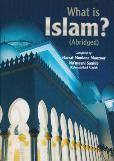What is Islam - eBook
Displaying items by tag: atheist
Incident of Imam Shaafi‘ee (rahimahullah) and an Atheist
An atheist once asked Imaam Shaafi‘ee (rahimahullah) to prove the existence of the creator, Allah Ta‘ala. Imaam Shaafi‘ee (rahimahullah) answered, “Look at the leaves of the mulberry tree. The color, taste, smell, composition and properties of every leaf are the same. Despite being exactly the same, when consumed by the silk worm, silk is produced. When visited by the bee, honey is produced. When consumed by the goat, dung is produced and when consumed by the musk deer, musk is produced. Only the design of a creator who is eternal and all powerful could cause so many diverse things to be produced from one substance. Otherwise, logic would demand that the end product of all be the same as the substance which entered all was the same.”
(‘Aqaa’id-ul-Islaam page.42)
Incident of Imam Abu Hanifah (rahimahullah) and a group of Atheists
A group of atheists once approached Imaam Abu Hanifah (rahimahullah) with the sinister intention of murdering him. On noticing them, Imaam Abu Hanifah (rahimahullah) decided to engage them in dialogue and so asked them, “If a person had to claim that he saw a ship which had neither a captain nor sailors to steer and navigate it, sailing through the waves of the ocean in a perfectly straight line, loading goods on one shore and offloading them on another shore, all on its own without a person to oversee and control it, what would you say?” The group immediately exclaimed, “Such a phenomenon is so illogical that no intelligent person would accept is as possible!” Imaam Abu Hanifah (rahimahullah) responded saying, “What has then happened to your intelligence? When you accept that one single ship cannot sail and operate without sailors aboard, then how do you accept that the entire universe can function and operate without Allah to control it?” The entire group was astonished at this line of reasoning and immediately repented and accepted Islam at the hands of Imaam Abu Hanifah (rahimahullah).
(‘Aqaa’id-ul-Islaam page.41)







